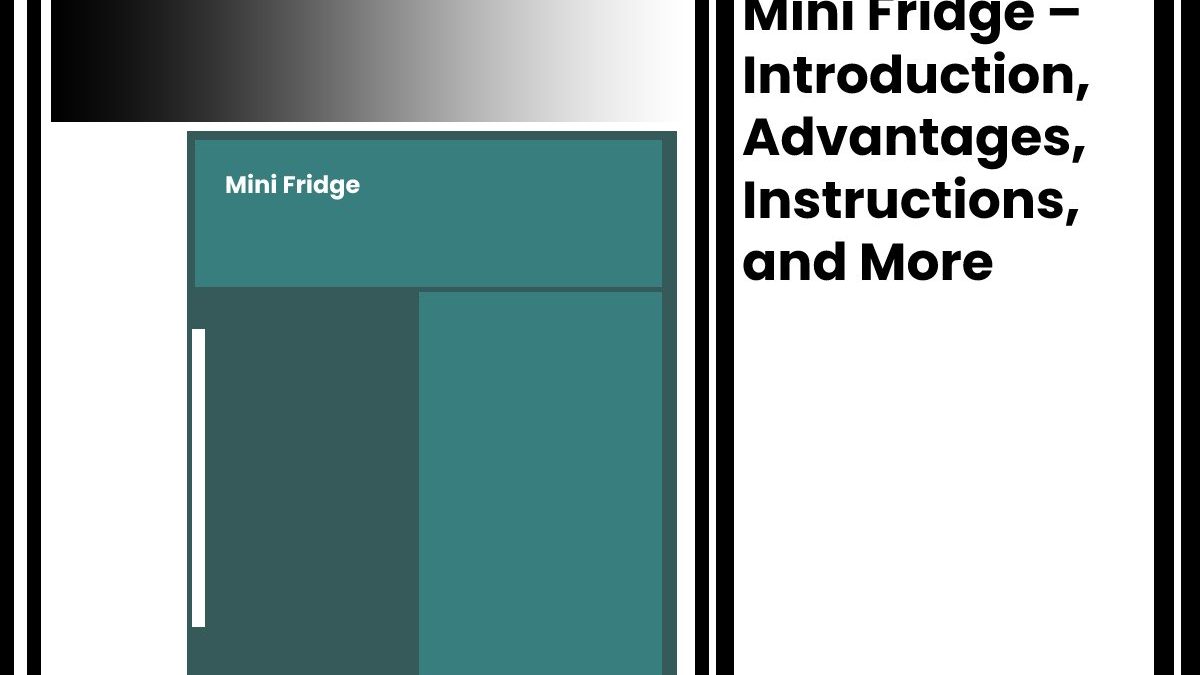Table of Contents
Introduction
Mini Fridge – Mini fridges are great for storing beverages in your room. They can also be helpful, allowing you to save on electricity, space, and initial costs you would incur when buying a regular-sized refrigerator.
Some mini fridges even come with a freezer, an added bonus in this price range. In addition, the compact size of the refrigerator allows you to place it anywhere, even above the table.
So, if you are looking for a new mini fridge for your room or something to complement your main fridge.
Also Read: Arteck Wireless Keyboard – Introduction, Relation, Use, And More
Safety Instructions
The manufacturer does not take any responsibility for damages in the following cases:
- Product damage due to mechanical impacts and overdose
- Modification of the product without the express permission of the manufacturer
- Use it for purposes other than those described in the user manual
- public security
Warning
- Do not use the device if it is damaged.
- If the power cord of this appliance is damaged, it should be replaced by the manufacturer, customer service or similarly qualified person to avoid safety hazards.
- This equipment can only be repaired by qualified personnel, and improper repair can lead to significant risks.
- The device may be used by children eight years of age or older and persons with reduced physical, sensory or mental abilities or lack of experience and knowledge, provided they have been supervised or used the device. Learn to do it safely. They are aware of the associated risks.
- Children will not perform cleaning and user maintenance without supervision.
- Children should not play with the device.
- Children should be managed to ensure they do not play with the equipment.
- Always store and use the device out of reach of children under eight.
- Do not store the equipment’s explosive material, such as aerosol cans containing flammable propellant gases.
What are the Advantages of a Mini Fridge over a Fridge?

The advantage of a mini refrigerator over a refrigerator is that it is an economical, space-saving, portable and energy-saving device.
Mini Fridge – Saves Space
We developed the mini fridge first because everyone can relax anywhere and anytime with a cold drink and some snacks. For this reason, small refrigerators are designed to focus on space efficiency.
Unlike bulky traditional refrigerators that can often be found in spacious residential and commercial properties, mini fridges are built to hold a few drinks in smaller spaces such as hotel rooms, offices, home bars, bedrooms and dorm rooms. It can install under the counter in small kitchens and homes with limited space.
Also Read: Opportunity Cost – Introduction, Types, Importance, and More
Mini Fridge – Affordable Price
Mini refrigerators come at lower prices as compared to regular refrigerators.
The cost of a mini fridge ranges from $30 to $800. Although portable models cost more than $1,200, they don’t compare to full-size refrigerators that cost around $500 and $10,000.
Mini Fridge – Mobility
A mini fridge will be an easy investment if you need a refrigerator to serve you while hosting friends in your garden on the weekends.
Firstly, buying another full-size refrigerator will cost a lot. Second, a mini fridge will be a better staple in your yard than a regular fridge because you’ll be storing drinks and snacks, not raw foods.
Lastly, your mini fridge can refresh you while watching TV or fit in your car when you go camping.
With a regular refrigerator, you don’t get that flexibility and portability.
Mini Fridge – Saves Energy
Compared to conventional refrigerators, mini refrigerators require less energy to operate. It is due to their smaller size and ability to lose less cool air when opened.
However, it is not energy efficient as it uses much more electricity than the full-size model.
Also Read: Welfare Economy – Introduction, Goals, Features, and More
What Foods can you Store in a Mini Fridge?
Mini fridges aren’t as versatile as the type of merchandise they can hold, so here are the items you can store in your mini fridge;
- red and white wine
- Nuts: Almonds and Cashews
- bread
- Water
- Curd
- Drinks: Milk and Juice
- macaroni
- Pasta
- leftover pizza
- cheese
- Ghee
- gram
- chocolate
- cold drink
- packaged goods
- candy
- egg
- fruit
- salad
- beer
What is the Electricity Consumption of a Small Refrigerator?
On average, a mini-fridge consumes 65 watts of energy when turned on and operates 8-10 hours daily. It translates to approximately 600 watts of daily energy consumption and 220 kWh of annual energy consumption.
At 12 cents per kilowatt-hour (kilowatt-hours), running a mini-refrigerator would cost between $20 and $30 per year.
Here are some examples of mini-fridges, their sizes, energy consumption, and how much each one costs to run.
If you want to estimate the electricity consumption of your mini fridge, be careful not to confuse electric power with electric power.
Electrical energy is the product of voltage and current measured in watts.
Electrical energy is the product of electrical energy and time of use and is measured in watt-hours.
Also Read: 45 Eth to USD – Introduction, Convert ETH to US Dollar, and More
What is the Power of a Mini Fridge?
Depending on the model and size, a mini-fridge consumes between 60 and 80 watts when turned on and about 200 watts when turned on (for a few seconds).
However, old mini refrigerators may require more power to operate.
Like other types of refrigerators, the wattage of a mini-fridge is usually listed on its specification label.
You can determine a mini fridge’s power by looking at its spec sheet or by Googling the model number.
The power of a small refrigerator is beneficial for estimating the energy it consumes.\
Also Read: Recycle Bin – Introduction, Windows Recycle Bin, and More
What is the Energy Consumption of a Small Refrigerator?
A small refrigerator consumes about 600 watts of energy per day. It is a monthly consumption of 18 kWh and annual consumption of approximately 220 kWh.
- Utmost mini-fridges are Energy Star rated and come with an Energy Guide label that estimates annual energy consumption.
- The Energy Guide label above is from Kenmore 99059 4.5 Cu. A small refrigerator has a volume of 3.5 cubic feet, and the annual electricity consumption of the fridge estimate at 237 kilowatt-hours.
- It also estimates the cost of its operation and compares it to other models, which is very useful, especially if you want to run a refrigerator on solar energy.
- If for some reason, your mini fridge doesn’t have an Energy Guide label, you can always estimate its energy consumption using its wattage.
- As stated above, electrical energy is the product of electrical energy and time of use:
- Electrical Energy (Watts/hour) = Electrical Energy (Watts) x Usage Time (Hours)
Frequently Asked Questions:
How many Amps does a Mini Fridge Draw?
On average, a standard 120-volt AC mini fridge draws between 0.5 amps and one amp when turned on and can go up to 3 amps on startup.
How much Solar Energy to Power a Small Refrigerator?
To run a solar-powered mini fridge, you will need a solar panel that produces about 600 watt-hours of umph daily.
In other words, you would need 100 to 200 electric energy of solar energy to power a small refrigerator. The more sunlight you receive in your area, the less solar energy you need.
For example:
To run a mini fridge on solar panels, someone in Denver, CO, would need only 100 watts of solar energy, while someone in Chicago, Illinois, would require 200 watts.
What kind of solar system do you want to power a Mini Fridge?
To run a solar-powered mini fridge, you will need a solar system consisting of:
- One or two 100W solar panels
- 100 AH battery
- 10 amp solar charge controller
- 300W inverter
How much solar power for a 12V refrigerator?
A typical 12 volt (1.7 cu ft) refrigerator consumes about 400 Wh of energy per day. To power a 12-volt refrigerator powered by solar energy alone, you will need a 100-watt solar panel.
How much battery does a 12-volt refrigerator use?
A 12-volt refrigerator connected to a 12-volt (50-amp) car battery can run for a day or two before the battery is completely discharge.
If it is connected to a 12V-100Ah battery, it can work for 3-4 days (depending on temperature and insulation.
Read Also: Digital Transformation – Introduction, Benefits, and More

